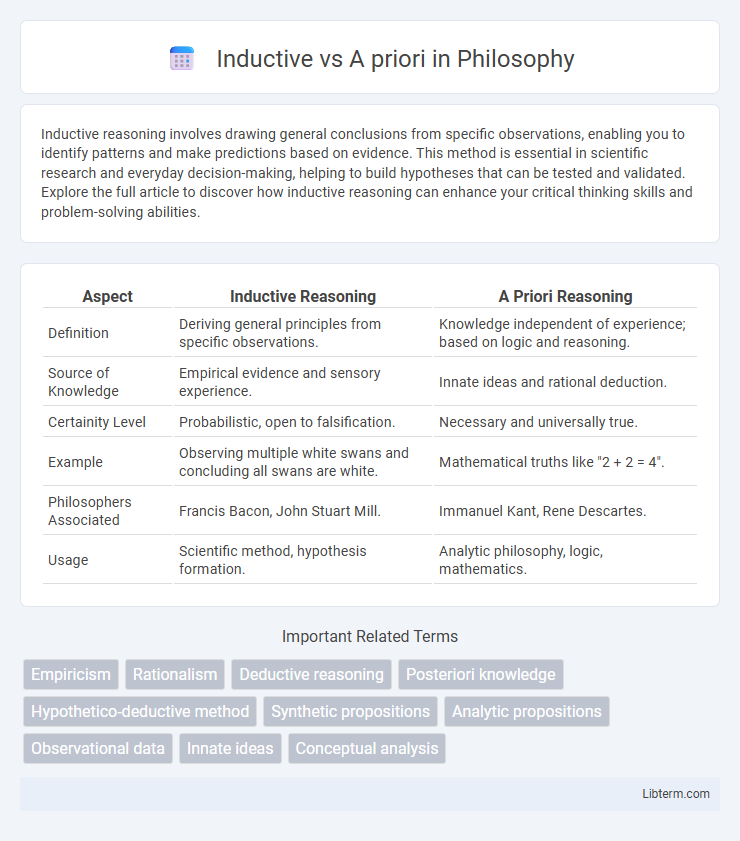Inductive reasoning involves drawing general conclusions from specific observations, enabling you to identify patterns and make predictions based on evidence. This method is essential in scientific research and everyday decision-making, helping to build hypotheses that can be tested and validated. Explore the full article to discover how inductive reasoning can enhance your critical thinking skills and problem-solving abilities.
Table of Comparison
| Aspect | Inductive Reasoning | A Priori Reasoning |
|---|---|---|
| Definition | Deriving general principles from specific observations. | Knowledge independent of experience; based on logic and reasoning. |
| Source of Knowledge | Empirical evidence and sensory experience. | Innate ideas and rational deduction. |
| Certainity Level | Probabilistic, open to falsification. | Necessary and universally true. |
| Example | Observing multiple white swans and concluding all swans are white. | Mathematical truths like "2 + 2 = 4". |
| Philosophers Associated | Francis Bacon, John Stuart Mill. | Immanuel Kant, Rene Descartes. |
| Usage | Scientific method, hypothesis formation. | Analytic philosophy, logic, mathematics. |
Introduction to Inductive and A Priori Reasoning
Inductive reasoning involves drawing general conclusions based on specific observations, emphasizing empirical evidence and probability. A priori reasoning relies on knowledge independent of experience, using logic and innate concepts to establish truths. Both methods play crucial roles in philosophical inquiry and scientific investigation, balancing evidence-based and conceptual understanding.
Understanding Inductive Reasoning
Inductive reasoning involves drawing general conclusions from specific observations, allowing for probabilistic inferences based on empirical evidence. Unlike a priori knowledge, which is derived from theoretical deduction independent of experience, inductive reasoning relies on repeated patterns and observations to form hypotheses or theories. This process is fundamental in scientific methods where evidence accumulation guides knowledge development and predictive insights.
Defining A Priori Knowledge
A priori knowledge is understood as information or truths that are known independently of experience, relying solely on reason and logical deduction. This contrasts with inductive reasoning, which derives general principles from specific observations or empirical evidence. Defining a priori knowledge involves recognizing its basis in innate concepts or necessary truths, such as mathematics and logic, that do not require empirical confirmation.
Key Differences Between Inductive and A Priori Approaches
Inductive reasoning derives general principles from specific observations, relying on empirical evidence and experience, whereas a priori knowledge is independent of experience and based on logical deduction or innate concepts. Inductive methods prioritize data collection and pattern recognition to form hypotheses, while a priori approaches utilize theoretical analysis and self-evident truths to establish knowledge. The key distinction lies in empiricism for inductive reasoning versus rationalism for a priori understanding.
Advantages of Inductive Reasoning
Inductive reasoning offers the advantage of generating generalized conclusions from specific observations, allowing for the development of new hypotheses and theories based on empirical evidence. This approach enhances adaptability in scientific inquiry by accommodating new data and refining knowledge progressively. Its strength lies in enabling predictive insights and fostering innovative problem-solving in diverse fields such as data science, medicine, and social research.
Strengths of A Priori Reasoning
A priori reasoning offers undeniable strengths through its basis in logic and necessity, providing conclusions that are universally true independent of empirical evidence. This reasoning method allows for certainty and mathematical precision, enabling the derivation of fundamental truths and principles without reliance on sensory experience. Its reliance on conceptual analysis makes it indispensable in fields such as mathematics, philosophy, and formal logic, where empirical data may be insufficient or unavailable.
Limitations and Challenges of Inductive Reasoning
Inductive reasoning, which involves deriving general principles from specific observations, faces limitations such as the risk of overgeneralization and the problem of limited sample sizes that may not represent the entire population. It struggles with uncertainty because conclusions are probabilistic rather than certain, making them vulnerable to new evidence that can refute previously drawn inferences. These challenges underscore the distinction from a priori knowledge, which is based on logical deduction and does not rely on empirical evidence.
Criticisms of A Priori Methods
A priori methods face criticism for their reliance on assumptions and logical deductions without empirical verification, which can lead to conclusions that lack practical applicability or fail to account for real-world complexities. Critics argue that a priori reasoning may produce knowledge that is detached from observable evidence, limiting its usefulness in scientific inquiry and decision-making processes. In contrast, inductive methods emphasize empirical data and observation, offering a more flexible and testable framework for knowledge acquisition.
Real-World Applications: Inductive vs. A Priori
Inductive reasoning drives real-world applications in fields like data science, where conclusions are drawn from empirical evidence and observable patterns to predict trends and inform decision-making. A priori knowledge underpins disciplines such as mathematics and logic, relying on inherent truths and deductive methods to establish foundational theorems without empirical input. Both approaches are crucial: inductive methods enable adaptive learning from new data, while a priori reasoning ensures rigorous validation of conceptual frameworks.
Conclusion: Choosing the Right Reasoning Approach
Inductive reasoning builds conclusions from specific observations to general principles, making it ideal for empirical research and hypothesis generation. A priori reasoning relies on logical deduction from established premises, ensuring conclusions are certain when premises are true, often used in mathematics and philosophy. Selecting the right approach depends on the research goal: empirical flexibility favors induction, while theoretical certainty demands a priori methods.
Inductive Infographic

 libterm.com
libterm.com